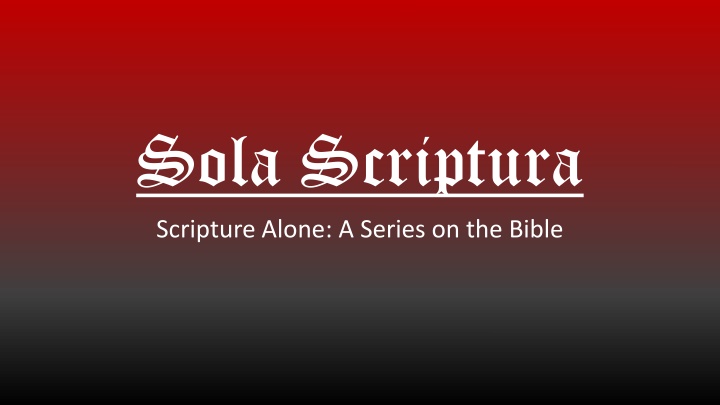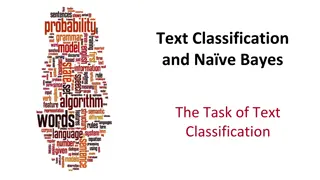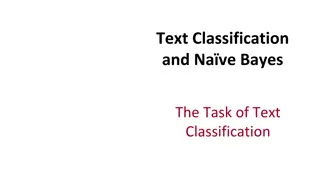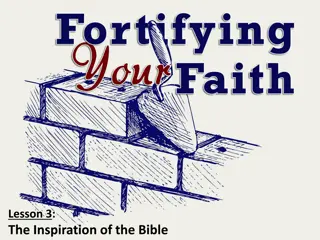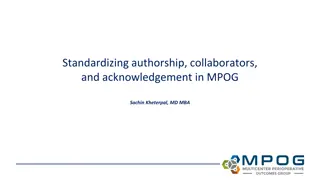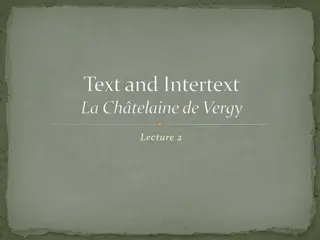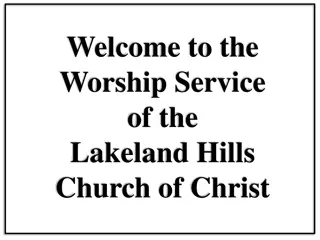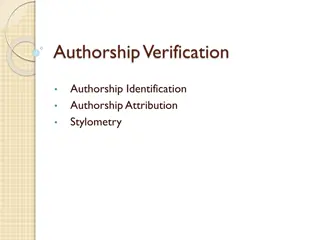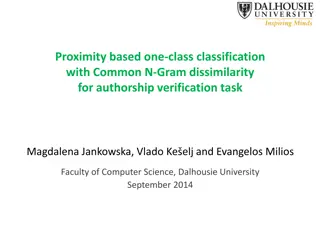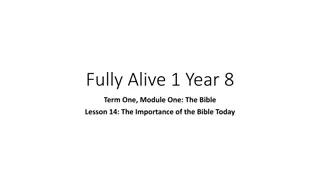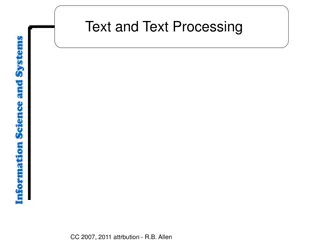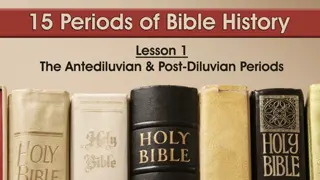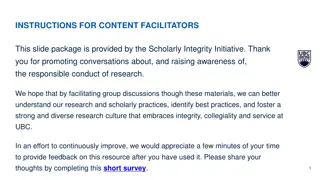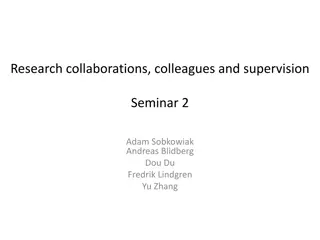Biblical Authorship - Who Wrote the Bible?
In this series on Scripture alone, delve into the origins and human authors of the Bible, exploring the diverse backgrounds of the individuals who contributed to its creation. Understand the dynamics of authorship, from the known to the debated, shedding light on the complexities of textual criticism and modern scholarship's questioning of traditional attributions. Discover insights into the challenges faced by scholars and the importance of recognizing Biblical authority amidst authorship debates.
Download Presentation

Please find below an Image/Link to download the presentation.
The content on the website is provided AS IS for your information and personal use only. It may not be sold, licensed, or shared on other websites without obtaining consent from the author.If you encounter any issues during the download, it is possible that the publisher has removed the file from their server.
You are allowed to download the files provided on this website for personal or commercial use, subject to the condition that they are used lawfully. All files are the property of their respective owners.
The content on the website is provided AS IS for your information and personal use only. It may not be sold, licensed, or shared on other websites without obtaining consent from the author.
E N D
Presentation Transcript
Sola Scriptura Scripture Alone: A Series on the Bible
Part 1: Biblical Authorship - Who Wrote the Bible?
God is the primary originator, the source of scripture He works in such a way through flawed and imperfect human authors to produce the inspired, inerrant scriptures. We ll talk about inspiration and inerrancy in a later session Primary Origination Primary Origination
Human Authors The 66 books of the Bible are authored by around 40 different human authors during a period of roughly 1500 years (1400 BC 90 AD) We do not know the human author of portions of the Bible and the authorship of others is debated in modern scholarship The human authors come from various walks of life allowing for us to see God s work and revelation from different perspectives Some human authors are priests, some are kings, some are musicians, some are fishermen, some are prophets, some are shepherds, one was a physician, one a tentmaker, and one a tax-collector.
List of Human Authors/Contributors Moses Obadiah Lemuel Joshua Jonah Nathan Samuel Micah Gad Jeremiah Nahum Matthew Ezra Habakkuk John Mark Mordecai Zephaniah Luke David Haggai John Solomon Zechariah Paul Isaiah Malachi James Ezekiel Asaph Peter Daniel Sons of Korah Jude Hosea Ethan Barnabas ? Joel Heman Apollos ? Amos Agur Unknown
Authorship Issues: Questioning Authorship It is common (thought not universal) in modern Biblical scholarship, especially among textual critics to question long recognized traditions of authorship as well as textually established authorship claims. You can find a scholar who denies established authorship of every single Biblical book if you search long enough. Why do these folks do this? To make a name for themselves: either in academia or in popular media, sometimes both. To sell books Because they do not affirm the Christian position of Divine Primary Origination and they do not recognize Biblical Authority over their lives
Authorship Issues: Author Unknown It is true we do not know the author of some books or segments of books for certain. For example: The book of Hebrews. The most likely theories about authorship include Paul, Luke, Barnabas, or Apollos but we do not know for certain. Some will attempt to argue that because we do not know the author that the text is less reliable or inspired.
Authorship Issues: Amanuensis vs. Author Amanuensis A scribe; a person who takes dictation or copies manuscripts. Peter used an amanuensis named Silvanus/Silas (1 Peter 5:12) Paul used at least one amanuensis, maybe more, including Tertius who is mentioned by name in Romans 16:22 Some have tried to assert that the use of an Amanuensis shows that the Bible can t be trusted and is not authoritative.
Authorship Issues: The Autographs An autograph is the original document penned in the hand of the original author We do not possess any of the autographs Some will try to assert that since we do not possess the autographs that we cannot possibly know with any measure of certainty that we have what the original author wrote.
Authorship Answers: Questioning Authorship Unequal Measures scholars critical of authorship will often distrust Biblical authorship while unquestioningly accepting the authorship of other documents of antiquity like the letter, poems, and orations of Pliny the Younger. Why inherently trust the stated authorship in one and not in the other? Innocent until proven guilty: case in point The Gospel of Thomas
Authorship Answers: Author Unknown Very little of the text of the Bible is by an unknown author. Even by the most liberal estimations less than 23.3% of the Bible is by an unknown author and this number includes questioning the authorship of: Joshua, Judges, Ruth, 1&2 Samuel, 1&2 Kings, Esther, Job, parts of the book of Psalms, and Hebrews. Many of the books of the Bible that do not include an explicit statement of authorship have a long and reliable history of attribution to a specific author in either Talmudic or Church tradition. The author being unknown does not inherently make a document less reliable it is merely a curiosity.
Authorship Answers: Amanuensis vs. Author Again unequal measures: No one in modern society demands that for a person to legitimately be the author they must be the only person writing, editing, or typing a document. We see examples in modern society of similar practices: editors, ghost writers, co-authors, stenographers, and transcriptionists. Why question the practice of dictation in the ancient world, but not in the modern world? Prime Example: John Milton having gone totally blind by 1652 wrote his famous work, published in 1667, Paradise Lost entirely through dictation to an amanuensis and friends. Would one say that Milton was not the author simply because of his dictation?
Authorship Answers: The Autographs Yet again, unequal measures: We do not possess the autographs of many well know documents of antiquity. For example: We do not possess the autographs of the works of Plato, Aristotle, Socrates, or Homer. Yet many unquestioningly accept that we have reliable transmission of their writings centuries after the originals would have been composed. Why doubt the reliability of copied text in the Bible, but accept the reliability of copied text in other works?
Conclusions: - We must treat all authorship issues with integrity not choosing to use different measures for different documents without reason. We must act consistently. - This does not mean we will come to the same conclusion about all documents. - The Bible s human authorship matters, but it matters in the greater context of Divine Primary Origination. - Men throughout history authored scripture but they did so according the will of God and in the way that God saw fit. - 2 Peter 1:21
